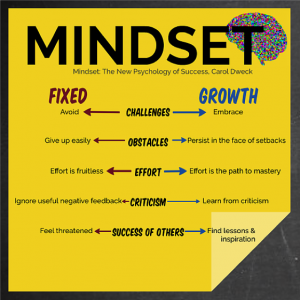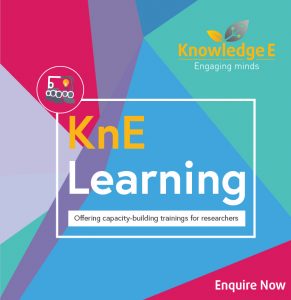[:en]I first read Carole Dweck’s Mindset: The New Psychology of Success about 5 years ago from the perspective of an educator, looking for resources for an undergraduate course. I was teaching on ‘Global Leadership’. Upon reading the book, I quickly understood why Dweck’s work had become an essential pillar for so many educational programs and leadership trainings. Her findings were not only insightful and based on sound research but also practical and applicable to the real world.
Fast forward to the present, and I’m still astounded at the breadth of application her lessons have across every sector of business. In this blog, we will focus on how these principles can be utilized in fostering successful research output through practicing a growth mindset.
To begin with, Dweck is an esteemed psychologist whose study focuses on answering a simple question: ‘Why are some people successful while others are not?’
Before we explore some of her conclusions, let’s begin with a few questions. (Answer them honestly.)
- How do you react when you are faced with a difficult challenge?
- What do you do when serious obstacles get in your way?
- How do you feel about making rigorous effort?
- How do you respond to criticism?
- How do you respond when other people are successful?
Your answers to these simple questions reveal a great deal about your mindset.
Dweck argues that there are two distinct mindsets that a person can embrace. The FIXED MINDSET and the GROWTH MINDSET. They are marked as follows:
What do you think? How do your answers compare to the outline above? What side do you currently fall on? If you are leaning toward a fixed mindset, do not fret. Dweck’s work proves that with an effort, ANYONE can have growth mindset and use that mindset to drive their success!
“Let us explore the way these ideas can help us be more successful researchers.”
Challenges
Every researcher knows that being consistently successful is no ‘walk in the park’. After all, if it was easy, everyone would do it. It takes commitment and the ability to tackle challenges head-on. You may lack funding opportunities, free time, knowledge about the publication process, academic writing skills, research design skills, and more. A fixed mindset would face these challenges and say, “This is too much. Why bother? I’m just not meant to be a published researcher.” A growth mindset takes the opposite approach and might say:
- No funding – “Fine. How can I get the funding? What organizations—locally and around the world—are interested in the type of research I’m doing? Perhaps, I can orient my research toward funding opportunities or commercialization from the start? Maybe I can establish partnerships with people who do have access to funding?
- No time – “I’ll make time. This is important to me, so I’m going to make publishing a priority in my life.”
- Lack of skills or knowledge – “There is so much information out there. I’m going to learn about the things I don’t know. I’ll attend training courses, read articles and books, listen to podcasts, watch webinars, and learn from mentors!”
Obstacles
In addition to the numerous challenges we face as researchers, we also have obstacles that constantly pop-up and get in our way. It happens! Teaching loads take up too much time, student emergencies, new institutional policy or changes in administration, shifting government regulations and political effects… the list goes on. Every great researcher has stories about obstacles and setbacks that they have faced in their careers.
With a growth mindset, you can take these setbacks for what they truly are: changes to learn. If you give up when things get in your way, you will NEVER find success.
Effort
This concept was particularly interesting to read about in Dweck’s book—the idea that some people see effort as meaningless, while other know that effort leads to results. The rigor and consistency required for publishing research can be exhausting. You might have to consider dozens of potential research projects before commencing; or submit your article to dozens of journals before it is accepted; or work with dozens of research partners before you find your go-to collaborators.
The growth-minded academic will see this effort as ‘worth it’. They know that having to rewrite the same article 20 times will sharpen their skills and allow them to edit quickly in the future. They know the extensive research on a topic (weather it is published or not) will make them an expert and may link to future projects or conclusions. They understand the value of their efforts, are encouraged by progress, and do not become disheartened by hard work.
Criticism
Personally, I feel that this is the hardest growth-mindset behavior to practice. I believe that it is human nature to dislike negative feedback. Of course, nobody enjoys receiving criticism but, as Dweck explains, it is not how you feel, it is how you respond. What do you do when you are rejected by a journal editor or a potential research partner? What if you get a critical feedback about your communication style, writing skills, or research methods?
With a growth mindset, you can see this criticism as an opportunity to examine your behavior, processes, or approach. You can learn from negative feedback and allow it to push you forward rather than bring you down. Hilary Clinton said it well when she stated, “Take criticism seriously, but not personally. If there is truth or merit in the criticism, try to learn from it. Otherwise, let it roll right off you.”
Success of Others
We all know those people (peers, friends, family, or co-workers) who feel threatened when others are achieving great things. Whatever the motivation for those feelings, I think we can agree that resentment, jealously, and the like are a waste of valuable time.
The fact is, in academia, there is enough to go around for everyone. We know that there is not a limited supply of knowledge in the world, therefore there is no limit to the amount of opportunities. There are so many people doing amazing things who you can connect to, learn from, and grow with. A growth-minded researcher will not only take lessons from success stories of others, they will also celebrate their success and take inspiration. They will always think, “If they can do it, so can I!”
Extra Note: The Power of Yet
In addition to these key markers, Dweck discusses the incredible power of YET in her book. The example stems from a school that she studied in that did not give failing grades. Rather, when a student did not meet a passing standard for a subject, they received a ‘Y’ – as in ‘not passing YET’. I apply this on the practice of research publication as follows:
- I haven’t published >>> I haven’t published YET
- I don’t know how to find an appropriate publisher >>> I don’t know how to find an appropriate YET
- I don’t have any research partners>>> I don’t have any research partners YET
You get the idea. This practice reminds me that approaching anything with a growth mindset will allow me to stay encouraged and motivated to succeed!
In conclusion, read the book and remember if you change your mindset, you can change your world!
“Becoming is better than being.” – Carol Dweck
Sources:
Dweck, Carol S. (2008). Mindset: The New Psychology of Success. New York: Ballantine Books.
By Samantha Miles, Training Consultant – Knowledge E




